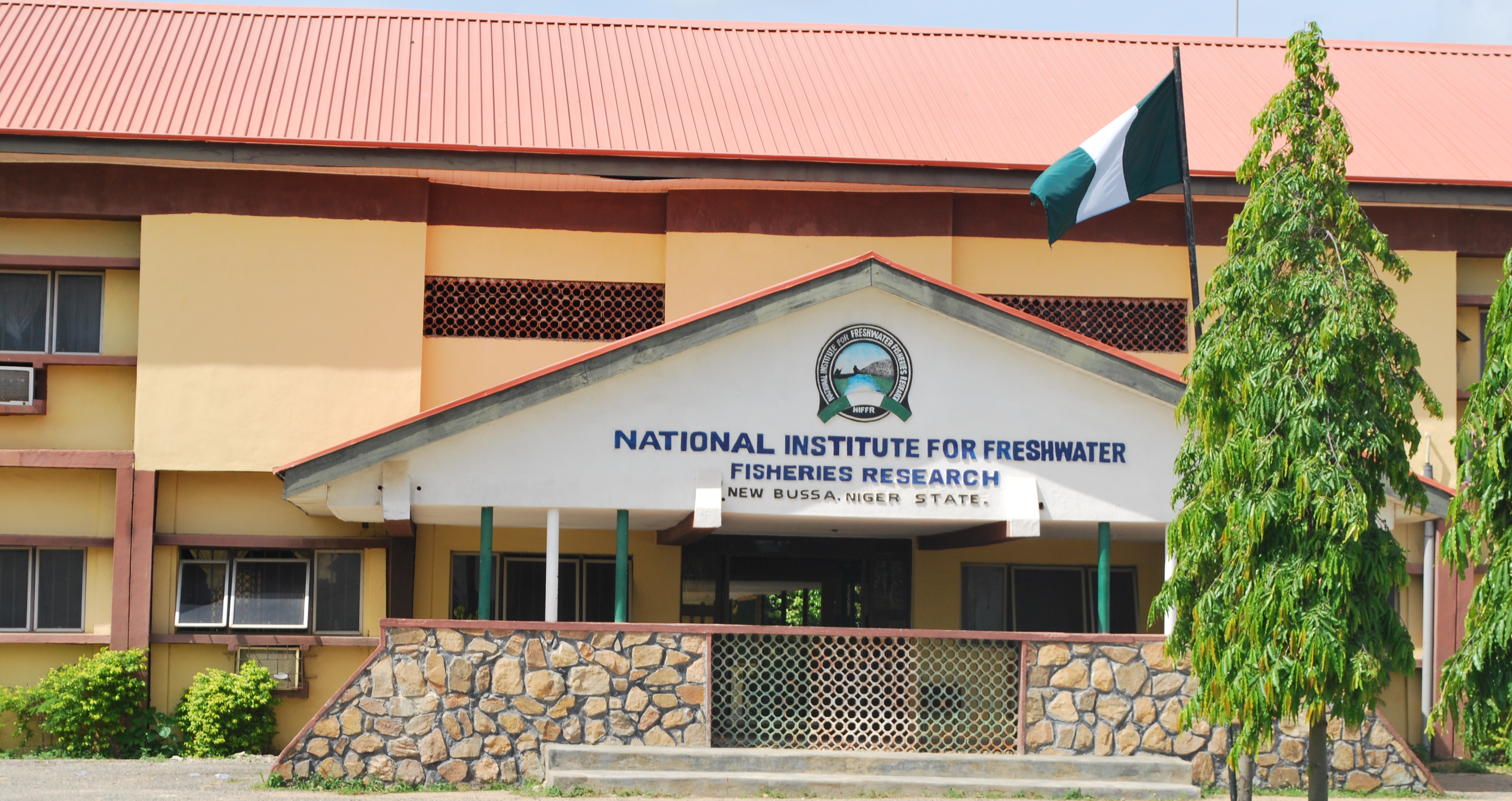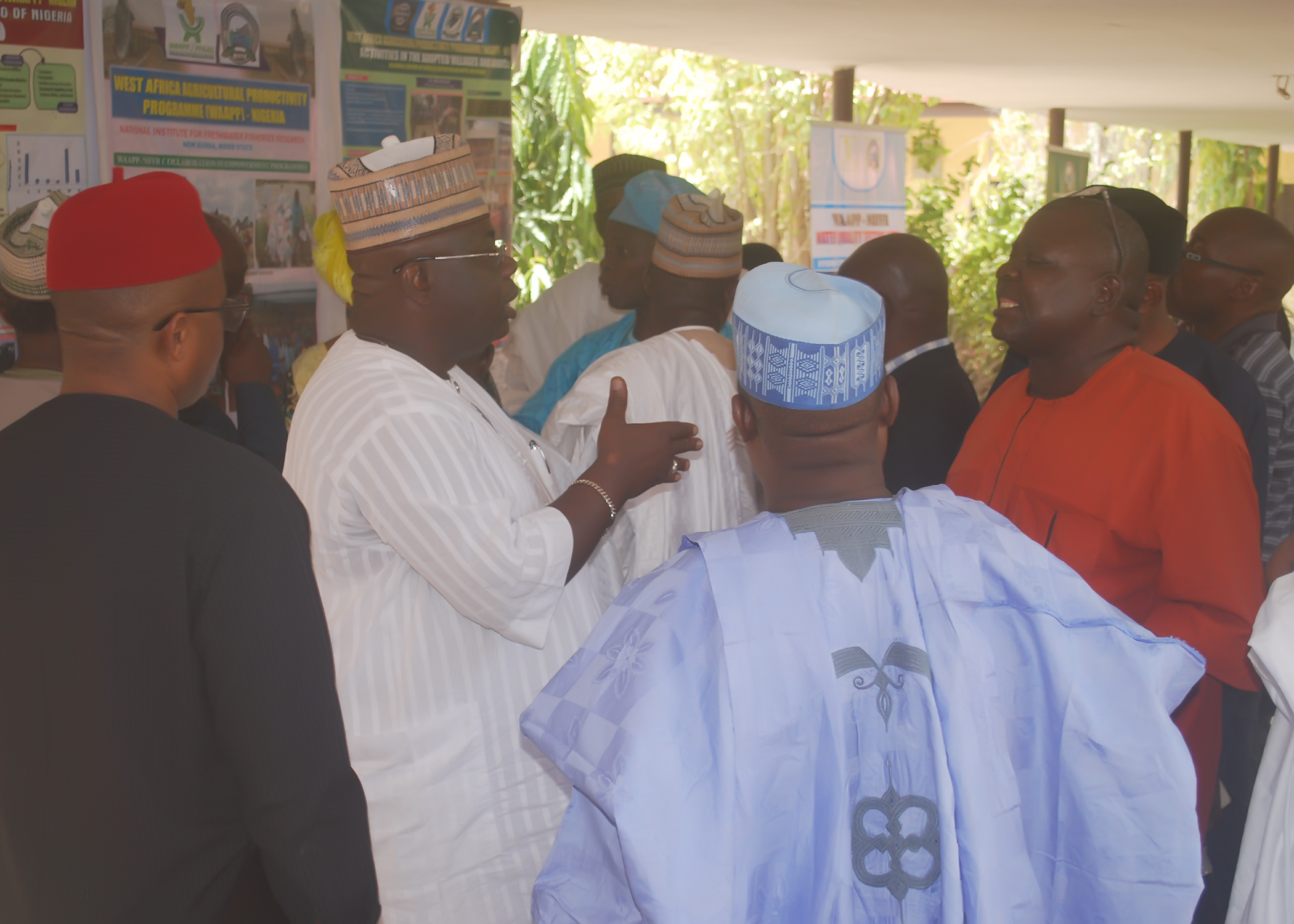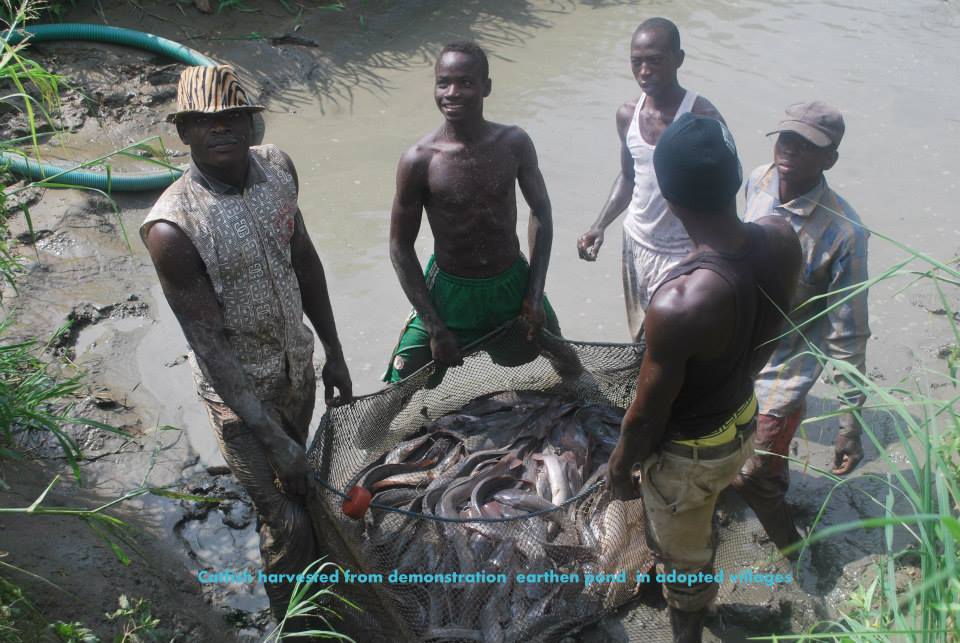Historical Background of National Institute for Freshwater Fisheries Research, New Bussa, Niger State
Brief background
National Institute for Freshwater Fisheries Research, New Bussa, was set up in 1968 as “The Kainji Lake Research Project” by the Federal Government of Nigeria with assistance from the United Nations Development Programme (UNDP). The Food and Agriculture Organization (FAO) was the executing agency while the then Federal Ministry of Agriculture and Natural Resources represented the Federal Government.
By 1975, FAO experts had formally withdrawn their participation and qualified Nigerians took over the mantle of leadership of what came to be known as Kainji Lake Research Institute.
At the initial stage, the mandate of the Institute was to carryout multidisciplinary activities on the Kainji and other man-made lakes in Nigeria in the following areas:-
Fisheries, Wildlife, Agriculture, Limnology, Public Health, Sociology, Economics and Range Management with the objective of making the research results available for the development of the country.
In 1987 the mandate changed to mono-commodity and research activities were centred in the following areas of Freshwater Fisheries and other Aquatic Resources such as:-
- Genetic improvement of freshwater fishes and other aquatic resources in rivers and lakes (natural and man-made).
- The abundance and distribution of freshwater fishes and other aquatic resources.
- Hydrological behaviour of natural and man-made lakes.
- Limnology of surface and ground water around natural and man-made lakes.
- Rational exploitation and utilization of freshwater aquatic resources.
- Ecological and socio-economic effects of the development of man-made lakes.
- Aquaculture;
- Any other matters related to a-g above.
The Institute shall also:
- carry out extension research liaison with Federal and State Ministries, primary producers, industries and other users of research results on matters of freshwater fisheries and other aquatic resources in collaboration with AERLS:
- provide technical and vocational training in Freshwater Fisheries and related fields leading to the award of National Diploma;
- provide laboratory and other technical services to fish farmers, industry and others concerned with freshwater fisheries problems;
- in carrying out this mandate, collaborate with all other relevant Research Institutes and Organizations
The Acting ED/CEO Explaining a Point of Interest to the Board Chairman.

Historical Background of National Institute for Freshwater Fisheries Research, New Bussa, Niger State
Brief background
National Institute for Freshwater Fisheries Research, New Bussa, was set up in 1968 as “The Kainji Lake Research Project” by the Federal Government of Nigeria with assistance from the United Nations Development Programme (UNDP). The Food and Agriculture Organization (FAO) was the executing agency while the then Federal Ministry of Agriculture and Natural Resources represented the Federal Government.
By 1975, FAO experts had formally withdrawn their participation and qualified Nigerians took over the mantle of leadership of what came to be known as Kainji Lake Research Institute.
At the initial stage, the mandate of the Institute was to carryout multidisciplinary activities on the Kainji and other man-made lakes in Nigeria in the following areas:-
Fisheries, Wildlife, Agriculture, Limnology, Public Health, Sociology, Economics and Range Management with the objective of making the research results available for the development of the country.
In 1987 the mandate changed to mono-commodity and research activities were centred in the following areas of Freshwater Fisheries and other Aquatic Resources such as:-
- Genetic improvement of freshwater fishes and other aquatic resources in rivers and lakes (natural and man-made).
- The abundance and distribution of freshwater fishes and other aquatic resources.
- Hydrological behaviour of natural and man-made lakes.
- Limnology of surface and ground water around natural and man-made lakes.
- Rational exploitation and utilization of freshwater aquatic resources.
- Ecological and socio-economic effects of the development of man-made lakes.
- Aquaculture;
- Any other matters related to a-g above.
The Institute shall also:
- carry out extension research liaison with Federal and State Ministries, primary producers, industries and other users of research results on matters of freshwater fisheries and other aquatic resources in collaboration with AERLS:
- provide technical and vocational training in Freshwater Fisheries and related fields leading to the award of National Diploma;
- provide laboratory and other technical services to fish farmers, industry and others concerned with freshwater fisheries problems;
- in carrying out this mandate, collaborate with all other relevant Research Institutes and Organizations

The Acting ED/CEO Explaining a Point of Interest to the Board Chairman.

Our Vision
To be the foremost Research Institute in setting directions for Nigerian Freshwater Fisheries and Aquatic Resources Research and Development
Our Mission
To advance scientific management through research and development in order to improve the livelihood of fishing communities and enhance sustainable exploitation, utilization and conservation of fisheries and other aquatic resources in inland water bodies of Nigeria.
Our Goal
To attain self-sufficiency in fish production for sustainable livelihood of fisherfolks, through rational exploitation of the inland aquatic resources of Nigeria.
Field Stations
Field stations are in Tiga at Kano State, Dadin kowa at Gombe State, Oguta at Imo State and Agenebode at Edo State.
DEPARTMENTS
- Directorate
- Administration
- Finance and Accounts
- Internal Audit
- Aquaculture and Biotechnology
- Artisanal Fisheries
- Environmental studies and Limnology
- Product Development and Engineering
- Socio–Economics and Extension Services [Outreach]
- Library, Information and Documentation
- Laboratory
Aquaculture and Biotechnology
- to develop appropriate technologies for the culture of freshwater fish in ponds, cages, pens, enclosures and for the integration of fish farming with other suitable farming systems to enhance sustainability and increased yield
- to develop efficient hatchery management techniques and protocols for the production of our indigenous fish species.
- to carry out nutritional studies with the aim of determining the nutritional requirements of our indigenous fishes and to develop cost-efficient fish feed from locally available feedstuffs.
Artisanal Fisheries
- inventory identification and characterization of inland water bodies in Nigeria
- to study the biology and identification of fisheries resources of Nigerian inland water bodies.
- development strategies for responsible fisheries of freshwater bodies
Environmental Studies
- to carry out research activities on the physico-chemical and biological characteristics of inland water bodies with specific reference to natural and man-made lakes and rivers.
- to carry out research activities on the isolation and mass production of live fish food organisms for use in fish hatcheries
- to assess physio-chemical and biological pollutants in our inland waters and recommend for water pollution control
- to carry out research into the hydrological behaviour of inland water bodies
- to ascertain the role of hydrometeorology in aquacultural practices in Nigeria
- to study the biology and management of aquatic macrophytes and non-fish aquatic animals of inland water bodies
PRODUCTS DEVELOPMENT AND ENGINEERING DEPARTMENT
Products
Development and Engineering Department has the primary goal of exploring and
developing new technologies and improving on existing ones in the areas of
products development, value addition, fish processing and preservation, fish
products packaging, fish spoilage and storage, and quality assurance.
To achieve these,
the following research areas are key:
Ø To research and develop new products for
aquaculture and fisheries development in Nigeria
Ø To study and improve on fish handling,
processing and preservation, packaging and storage techniques
Ø To develop novel value added fish products
through research and innovation for improved nutrition.
Ø To develop Standard Operating Procedures for
processes and activities to meet national and international requirements for
food quality and safety
OUTREACH DEPARTMENT
The department is the bridge between the researchers and end users. They provide information on fisheries researches conducted by the Institute which must impact on the end users, individual or groups and set up system to enable the Institute to tackle the needs by conducting research for self-sufficiency in fish food. Therefore, the Department is set up to achieve the following activities:
![]() Conduct socio economic and extension research.
Conduct socio economic and extension research.
![]() Disseminate Promoting research results in Aquaculture practices, fish
preservation, processing and value addition.
Disseminate Promoting research results in Aquaculture practices, fish
preservation, processing and value addition.
![]() Package and disseminate e-newsletters on fisheries technologies to
end-users.
Package and disseminate e-newsletters on fisheries technologies to
end-users.
![]() Coordinate trainings in Fisheries and Aquaculture development.
Coordinate trainings in Fisheries and Aquaculture development.
![]() Multimedia releases on indoor and outdoor fisheries services.
Multimedia releases on indoor and outdoor fisheries services.
![]() Provide educational support and skill development on fisheries and
aquaculture activities.
Provide educational support and skill development on fisheries and
aquaculture activities.
![]() Coordinate workshops, conferences, trade fairs and other related
activities within and outside the Institute.
Coordinate workshops, conferences, trade fairs and other related
activities within and outside the Institute.
LIBRARY, INFORMATION AND DOCUMENTATION SERVICES
Information is very vital to every organization, if you are not informed you will be deformed , NIFFR library plays a vital role in promoting research work by providing relevant information needs to research scientists, stakeholder in fisheries and aquaculture and students on industrial training.
Below are activities carried out in the library, Information and Documentation.
1. Processing of information by cataloguing it before placing on the shelve
2. Organizing library materials for easy retrieval for research scientists and library users.
3. Acquisition of relevant fisheries textbooks and journal for the consultation of research scientists and all library users
4. Information sharing to the scientists through different means e.g email, telephone, Whats App especially during the M.SC and Ph.D. programme
5. Bibliographic Publications of all research work published in Journals and conferences by NIFFR research scientists
6. Printing: Production of NIFFR publications especially annual report and Newsletters
7. NIFFR library projects the image of NIFFR as whole and research scientists through ASFA. NlFFR library is the only ASFA partners in Nigeria; the library provides the abstract work done by all research scientists and make it available on ASFA database.
 NIFFR
NIFFR




